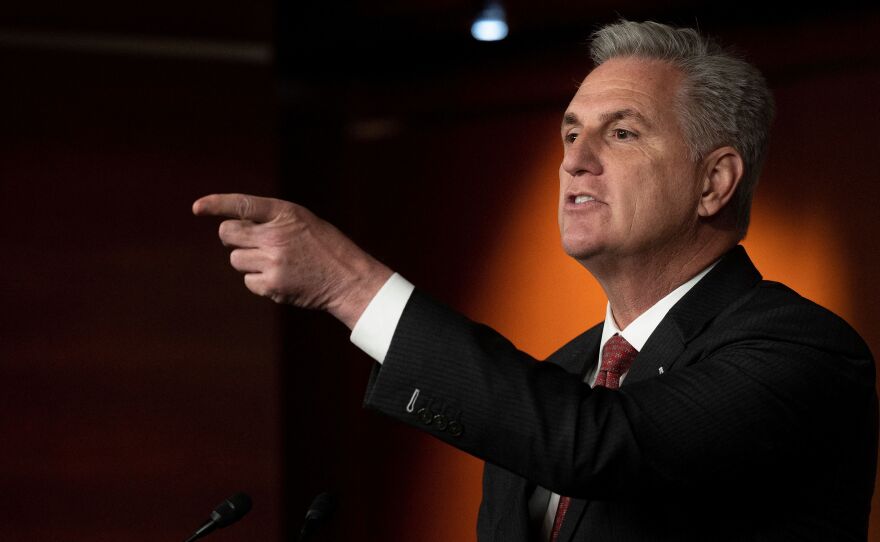Speaker 1: (00:01)
Democrats in the house are taking a victory lap today, celebrating the passage of the $2 trillion build back better social services. Bill, the legislative package contains a host of expanded services, including paid family, leave expanded childcare assistance, new Medicare benefits plus billions to combat climate change. This legislation is the companion piece to president Biden's billion dollar infrastructure package that passed the house earlier this month, but it did not reflect the bipartisan nature of that vote. Republican leader, Kevin McCarthy spoke for eight hours overnight, temporarily delaying the build back, better vote, and no Republicans voted for the bill. Joining me is San Diego Congresswoman Sarah Jacobs and Congresswoman Jacobs. A welcome to the program.
Speaker 2: (00:51)
Thank you so much for having me. There is
Speaker 1: (00:53)
So much included in this bill. What stands out to you as the most important parts for your constituent?
Speaker 2: (01:01)
You know, I was so excited that we were able to pass the build back better act through the house. One of my priorities, since I got to Congress has been making sure that we are addressing childcare. Uh, you know, I talked to my constituents regardless of their political ideology. Uh, if they have kids, they are struggling to afford childcare. And so we are really focused on making sure we're getting that childcare sends the out the door as quickly as possible that we are working with the states to implement universal pre-K and that we are working to continue the expanded child tax credit even after next year, which is what was in the build back better act.
Speaker 1: (01:36)
Affordable housing is a huge issue here in San Diego, as you know, how does this build back better act address that
Speaker 2: (01:43)
Is hundreds of billions of dollars in the boat back better act for housing. Most of it will go into vouchers, but some of it we'll go into some other programs that will also help with supply. And we know that this is a priority for us here in San Diego. So I'll be working really closely with the department of housing and urban development to make sure that we get the housing funding that we need.
Speaker 1: (02:05)
And what's in the climate action portion of this bill.
Speaker 2: (02:08)
There are a lot of really exciting parts of the climate component of this bill together with the bipartisan infrastructure deal. They've worked together to make sure that we're reducing our carbon emissions in line with the Paris Accords. It is the most historic and transformational investment in addressing climate change that the United States has ever made. It includes tax credits. It includes making sure that we are addressing environmental justice. Um, there's a lot of really exciting pieces and we'll be working with the Senate to make sure that all of those pieces remain in the final bill and
Speaker 1: (02:42)
We'll pay for all this by new taxes on the rich,
Speaker 2: (02:46)
Uh, the entire bill is paid for in part by making sure that the wealthy and big corporations pay their fair share in part by stepping up enforcement of the wealthy, uh, through IRS enforcement, uh, and in part through savings from prescription drug pricing reform that is in the bill. No.
Speaker 1: (03:02)
How confident are you though that the new corporate and millionaire taxes will cover the several hundred billion dollar deficit created by this huge bill?
Speaker 2: (03:13)
I have talked to numerous Nobel prize winning economists, um, the white house, the joint committee on taxation. Moody's, I'll say that this bill actually helps produce the deficit. And that is just looking just at the revenues and at the spending part of what I'm so excited about in this bill is that they're the kind of investments that we know have huge payoffs. So we know that for every dollar we spend on addressing childhood poverty, now we actually saved $7 down the road. We know so many parents aren't able to join the workforce because of childcare. And, uh, we lose a trillion dollars to our economy from, uh, parents not joining the workforce every single year. And so not only is it about the spending and the revenue bouncing out, although, uh, all these estimates say that they do, but also the amount of economic growth and deficit savings we will get from the investments that we're making
Speaker 1: (04:07)
Now a minority leader, Kevin McCarthy gave one of the longest speeches in the history of Congress last night, apparently to delay the vote on the build back, better act. And you presided over a part of that speech. What was that like Congresswoman
Speaker 2: (04:21)
That's right. I presided from about 1:00 AM until about five 15 in the morning when he finished talking, uh, it was a long night, uh, did not get to sleep. Uh, and I will say that his speech was kind of rambling, very full of falsehoods, pretty inappropriate at times, a lot of pointed comments, uh, at me at the chair, which is not, not decorum in the house. And, you know, I, it, it, it appears. And he, he basically said that he was doing that because he wanted to beat speaker Pelosi's record of the longest floor speech. But frankly, she was doing hers in foreign shield. So I'm not sure he really beat that
Speaker 1: (04:56)
Republicans in the house, including San Diego county, soul Republican Darryl. I said, no Republicans voted for this bill. Are you disturbing?
Speaker 2: (05:05)
Look, I think that it just goes to show how broken things are in Washington right now, because the fact of the matter is 200 people in Washington. Don't get to decide what's bipartisan. When I'm talking to my constituents. Even if they're Republicans, they are struggling with childcare and want help. Um, they know that they need things like the child tax credit. They know that they need immigration and to address climate change. And so, um, for me, this is a very bipartisan bill, whether or not 200 people in Washington decide to vote for it,
Speaker 1: (05:36)
Build back better now moves on to the Senate where it faces opposition from Republicans and from Democrat senators, mansion and cinema. How do you think that can be resolved?
Speaker 2: (05:47)
Uh, you know, the bill we passed through the house, we have about 90% agreement on everything. That's in it with the Senate. Um, there are a few pieces that we're still working through, but when president Biden talked to us a couple of weeks ago, he was very competent that he could get 51 votes in the Senate and I'm going to trust him to be able to do that.
Speaker 1: (06:05)
And when are you hoping the bill goes to the president for his signature?
Speaker 2: (06:10)
I'm hoping before the end of the year so that we can make sure we start next year off on the right foot.
Speaker 1: (06:14)
Right then I've been speaking with San Diego, Congresswoman Sarah Jacobs and Congresswoman Jacob's. Thank you very much.
Speaker 2: (06:21)
You are so welcome.
Speaker 3: (06:25)
Uh, [inaudible].
Updated November 19, 2021 at 10:22 AM ET
The House voted on near-party lines Friday morning to approve a roughly $2 trillion social and climate spending package, ending months of squabbles among Democrats over the details of the far-reaching measure.
The vote was 220-213, with one Democrat, Rep. Jared Golden of Maine, joining all Republicans in opposition.
The legislation is meant to fulfill many of President Biden's promises during the 2020 campaign, including plans to address climate change and provide a stronger federal safety net for families and low-income workers.
"We have the Built Back Better bill that is historic, transformative and larger than anything we have ever done before," House Speaker Nancy Pelosi, D-Calif., said on the House floor. "If you're a parent, a senior, a child, a worker, if you are an American ... this bill's for you and it is better."
House Democrats overcame internal divisions over the cost and scope of the spending package, but the fight will continue as the bill heads to the Senate for revisions.
The vote was delayed after House Minority Leader Kevin McCarthy, R-Calif., spoke all through the night — for more than eight hours. His speech decried Democrats' spending plans, but also veered to subjects including China and border security.
"Never in American history has so much been spent at one time," he said. "Never in American history will so many taxes be raised and so much borrowing be needed to pay for all this reckless spending."
Biden praised House passage of the bill, noting it was the second time in two weeks that the chamber moved two "consequential" pieces of his legislative agenda, referencing the new infrastructure law. He described the vote as a "giant step forward in carrying out my economic plan to create jobs, reduce costs, make our country more competitive, and give working people and the middle class a fighting chance."

What's in the measure
The legislation includes:
- $550 billion to address climate change through incentives and tax breaks;
- funding to extend the expanded, monthly child tax credit for one year;
- housing assistance, including $150 billion in affordable housing expenditures;
- expansions to Medicaid and further assistance to reduce the cost of health care premiums for plans purchased under the Affordable Care Act;
- four weeks of paid family and medical leave;
- funding for universal pre-K for roughly 6 million 3- and 4-year-olds;
- a provision to allow Medicare Parts B and D to negotiate prices directly with drug manufacturers on certain drugs and cap out-of-pocket spending for seniors at $2,000 per year;
- a $35 cap on monthly insulin expenses.
The spending is mostly offset with taxes on the wealthy and corporations, including:
- a 5% surtax on taxpayers with personal income above $10 million, and an additional 3% added on income above $25 million;
- a 15% minimum tax on corporate profits of large corporations that report more than $1 billion in profits;
- a 1% tax on stock buybacks;
- a 50% minimum tax on foreign profits of U.S. corporations.
House Democrats unite after months of fighting
Moderate Democrats ultimately voted for the legislation after concerns that estimates from the nonpartisan Congressional Budget Office would show the measure to be more costly than leaders have projected.
Ultimately, the CBO found the bill would cost the federal government $367 billion over the next decade, "not counting any additional revenue that may be generated by additional funding for tax enforcement." Many Democrats, including the White House, argue that when that is taken into account, the measure would pay for itself.
Members of the fiscally moderate New Democrat Coalition endorsed the legislation ahead of the final cost estimates. Rep. Brad Schneider, D-Ill., said the official estimates don't take into account extra revenue from increased tax enforcement — or the broader economic benefits of the legislation.
"When discussing the importance of the bill, we also have to talk about the costs that would be incurred if we don't pass this bill," Schneider said on a call with reporters. "The cost of inaction is simply too high, and it can only be headed off if we act now."
For progressive Democrats, the vote fulfills a promise from Biden and House leaders not to neglect policies that have energized the left wing of their party. Members of the Congressional Progressive Caucus set aside major demands throughout the negotiations, including more spending and plans for aggressive changes to the nation's health care system, in order to reach an agreement that satisfied the full caucus.
Senate hurdles could drag on for weeks
The House vote is just the latest step in a lengthy process that will almost certainly involve further changes to the bill.
Centrist Sens. Kyrsten Sinema, D-Ariz., and Joe Manchin, D-W.Va., have each expressed concerns about the House version of the legislation. Manchin is particularly opposed to a provision that would provide four weeks of paid family and medical leave for most workers. Sinema's objections are less clear but Democrats need both lawmakers on board in order for the legislation to pass.
It is unclear how long it would take for senators to work out their disagreements and finalize the legislation. Once that work is done, the Senate would have to start a lengthy process to vote on the bill using the budget reconciliation process that would allow the bill to be passed in the Senate with 50 votes, rather than the 60 votes needed for most legislation.
Pelosi told reporters on Thursday that Senate staff have already completed a necessary step to ensure the legislation meets the basic requirements to avoid a Republican filibuster. But the process still has several steps, including a series of unlimited amendment votes known as a vote-a-rama.
Copyright 2021 NPR. To see more, visit https://www.npr.org.







